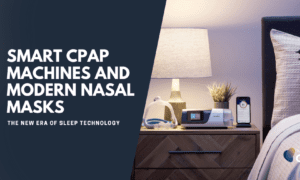A new survey shows that more than half of people diagnosed with obstructive sleep apnea (OSA) aren’t satisfied with their current treatment. Usually, treatment involves a continuous positive airway pressure (CPAP) machine, but new treatment options are arriving, providing hope for patients.
Survey says… patients want to ditch CPAP machines
When many patients are diagnosed with obstructive sleep apnea, it’s only natural to respond to the prospect of having to use a CPAP machine every night with concern — or even dread in some cases.
While CPAP is known to be effective when used correctly, compliance is an issue. According to a the survey conducted by Quantum Research Group, LLC, although 90% of patients use their PAP machine nightly, almost 30% of them take it off and do not comply with treatment, often due to issues like mask discomfort.
This same survey found that 61% of sleep apnea patients who use a CPAP machine experience sleep interruptions multiple times a week. That may be why almost 70% of patients would be willing to switch to a pill-form treatment, with 84% citing ease of use as the top reason to switch.
Medications for obstructive sleep apnea are arriving
This is where oral treatments in the form of a pill are entering the OSA discussion. For example, Incannex’s (NASDAQ:IXHL) IHL-42x is a proprietary combination drug consisting of low-dose dronabinol, which is a synthetic form of tetrahydrocannabinol (THC), and the carbonic anhydrase inhibitor acetazolamide.
A Phase 2a study in 2022 found that IHL-42X reduced the standard measure of OSA, apnea-hypopnea index (AHI), by an average greater than 50% at the low dose in the trial. Additionally, one-quarter of patients enjoyed a reduction of more than 80%.
In May, the company began dosing patients in the U.S. in its RePOSA Phase 2/3 study. RePOSA is a randomized, double-blind clinical trial to determine the safety and efficacy of IHL-42X in subjects with OSA who are intolerant, non-compliant, or naïve to positive airway pressure (PAP). The beginning of dosing follows the opening of an investigational new drug (IND) application with the U.S. Food and Drug Administration.
Separately, the privately held Apnimed is developing another combination drug for sleep apnea. AD109 combines aroxybutynin, used to treat overactive bladder, with ADHD (attention-deficit/ hyperactivity disorder) drug atomoxetine. In clinical trials, AD109 displayed clinically meaningful improvements in OSA. The next step is a Phase 3 clinical trial.
While not an easy-to-take pill, there’s also been buzz about whether the weight-loss injectable drug tirzepatide, sold under the brand names Mounjaro and Zepbound by Eli Lilly (NYSE:LLY), might be able to help with OSA.
As reported recently in The New England Journal of Medicine, the SURMOUNT-OSA Phase 3 clinical trials evaluated tirzepatide injection for the treatment of moderate-to-severe OSA in adults with obesity with PAP therapy experience or naive to it. The trial found that the tirzepatide groups met all primary and key secondary endpoints, demonstrating a mean reduction of up to 62.8% on the AHI, or about 30 fewer events restricting or blocking a person’s airflow per hour of sleep, compared to placebo, according to Eli Lilly.
Evolving CPAP technology
Until these oral and injectable treatments for OSA land on the market, patients have a few options. Other than the traditional PAP or CPAP machine, Inspire Medical (NYSE:INSP) launched an implant that helps with the condition last summer.
The surgically implanted device is placed under the skin, where it stimulates the upper airway while the patient sleeps. It is operated with a small remote that the patient uses to turn on the device just before sleep, making it a potentially convenient option for people with OSA, particularly while traveling.
ResMed (NYSE:RMD) has also launched new CPAP technology called myAir, which provides data to patients letting them know how well their therapy worked overnight. myAir also tracks four metrics associated with nightly sleep, and ResMed provides personalized coaching to help patients.
The future of CPAP technology
While CPAP machines have been around for a long time, many patients would jump at the chance to just take a pill instead of wearing a mask every night. It may be a while before CPAP machines become obsolete, so the widespread dumping of stocks related to these technologies could be a bit premature.
However, with oral treatments in clinical trials, makers of conventional CPAP machines could eventually see their revenues start to decline.
Disclosure: Ari Zoldan is CEO of Quantum Media Group, LLC and Quantum Research Group, LLC and Incannex is a client of Quantum.



































